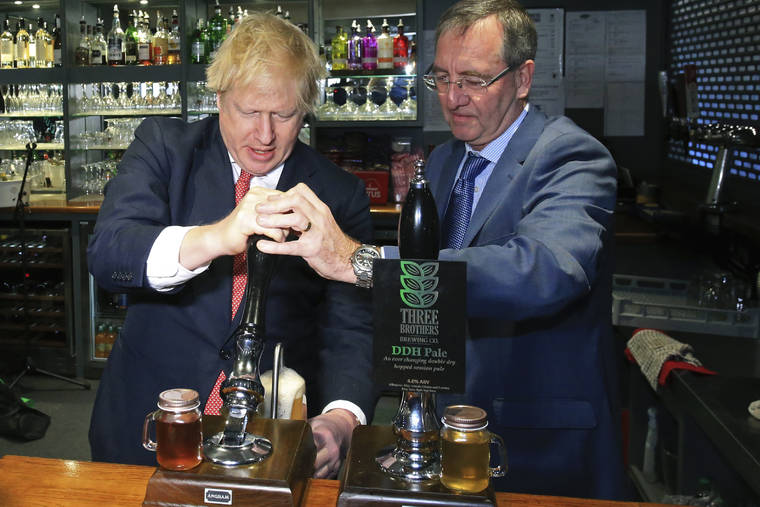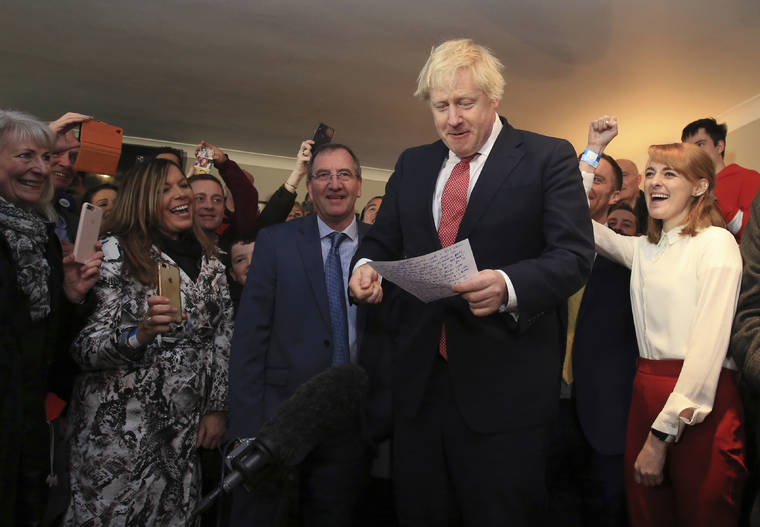LONDON — British Prime Minister Boris Johnson pledged Saturday to repay the trust of voters in the working-class heartland of northern England who rejected the Labour Party and helped give him an 80-seat majority in Thursday’s election.
Speaking to cheering supporters at a cricket club in Sedgefield — the constituency once held by Labour former prime minister Tony Blair — Johnson acknowledged the seismic shift that helped sweep him to victory.
“I know that people may have been breaking the voting habits of generations to vote for us,” he said. “And I want the people of the northeast to know that we in the Conservative Party and I will repay your trust.”
In a victory speech outside 10 Downing Street on Friday, Johnson called for an end to the acrimony that has festered throughout the country since the 2016 Brexit referendum, and urged Britain to “let the healing begin.”
Johnson’s campaign mantra to “get Brexit done” and widespread unease with the leadership style and socialist policies of opposition leader Jeremy Corbyn combined to give the ruling Conservatives 365 seats in the House of Commons, its best performance since party icon Margaret Thatcher’s last victory in 1987. Labour slumped to 203 seats, its worst showing since 1935.
While Johnson was on a victory lap, Corbyn — who has pledged to stand down next year — was under fire from within his own party, where there was little sign of healing.
Former lawmaker Helen Goodman, one of many Labour legislators to lose seats in northern England, told BBC radio that “the biggest factor was obviously the unpopularity of Jeremy Corbyn as the leader.”
Another former Labour lawmaker criticized the election campaign as muddled. Anna Turley told the BBC the party put forward an overwhelming number of policies and voters “just didn’t believe we were the party that could deliver on any of it.”
John McDonnell, Labour’s finance spokesman, said Saturday he would stand down from the position when Corbyn is replaced.
“I’ve done my bit. We need to move on at that stage with that new leader,” he told reporters.
Armed with his hefty new majority, Johnson will start the process next week of pushing Brexit legislation through Parliament to ensure Britain leaves the European Union by the Jan. 31 deadline. Once he’s passed that hurdle, breaking three years of parliamentary deadlock, he has to seal a trade deal with the bloc by the end of 2020.
“We’ve just been going over the timetable we can definitely get it in before Christmas, and we’re out on Jan. 31,” Johnson said.
While Johnson’s large majority means he has relatively clear air ahead on Brexit, he faces turbulence over renewed calls for a referendum on Scottish independence following the strong election showing of the Scottish National Party.
The front page of Saturday’s edition of The Scotsman newspaper featured photos of Johnson and SNP leader Nicola Sturgeon and the headline: “Two landslides One collision course.”
Johnson owes his success, in part, to traditionally Labour-voting working-class constituencies in northern England that backed the Conservatives because of the party’s promise to deliver Brexit. During the 2016 referendum, many of those communities voted to leave the EU because of concerns that immigrants were taking their jobs and alleged neglect by the central government in London.
In Sedgefield, he paid tribute to his new lawmakers who turned those concerns into a big election victory.
“Thank you for your wonderful achievement in transforming our party, transforming the political map of this country,” he said.
———
Follow AP’s full coverage of Brexit and British politics at https://www.apnews.com/Brexit.





